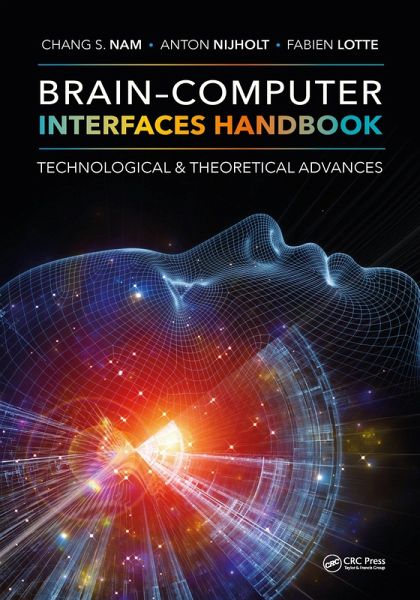
Brain-Computer Interfaces Handbook (eBook, PDF)
Technological and Theoretical Advances
Redaktion: Nam, Chang S.; Lotte, Fabien; Nijholt, Anton
Versandkostenfrei!
Sofort per Download lieferbar
114,95 €
inkl. MwSt.
Weitere Ausgaben:

PAYBACK Punkte
57 °P sammeln!
Brain-Computer Interfaces Handbook: Technological and Theoretical Advances provides a tutorial and an overview of the rich and multi-faceted world of Brain-Computer Interfaces (BCIs). The authors supply readers with a contemporary presentation of fundamentals, theories, and diverse applications of BCI, creating a valuable resource for anyone involved with the improvement of people's lives by replacing, restoring, improving, supplementing or enhancing natural output from the central nervous system. It is a useful guide for readers interested in understanding how neural bases for cognitive and s...
Brain-Computer Interfaces Handbook: Technological and Theoretical Advances provides a tutorial and an overview of the rich and multi-faceted world of Brain-Computer Interfaces (BCIs). The authors supply readers with a contemporary presentation of fundamentals, theories, and diverse applications of BCI, creating a valuable resource for anyone involved with the improvement of people's lives by replacing, restoring, improving, supplementing or enhancing natural output from the central nervous system. It is a useful guide for readers interested in understanding how neural bases for cognitive and sensory functions, such as seeing, hearing, and remembering, relate to real-world technologies. More precisely, this handbook details clinical, therapeutic and human-computer interfaces applications of BCI and various aspects of human cognition and behavior such as perception, affect, and action. It overviews the different methods and techniques used in acquiring and pre-processing brain signals, extracting features, and classifying users' mental states and intentions. Various theories, models, and empirical findings regarding the ways in which the human brain interfaces with external systems and environments using BCI are also explored. The handbook concludes by engaging ethical considerations, open questions, and challenges that continue to face brain-computer interface research.
Overall, this handbook provides a synopsis of key technological and theoretical advances that are directly applicable to brain-computer interfacing technologies and can be readily understood and applied by individuals with no formal training in BCI research and development.
- Features an in-depth look at the different methods and techniques used in acquiring and pre-processing brain signals, extracting features, and classifying the user's intention
- Covers various theories, models, and empirical findings regarding ways in which the human brain can interface with the systems or external environments
- Presents applications of BCI technology to understand various aspects of human cognition and behavior such as perception, affect, action, and more
- Includes clinical trials and individual case studies of the experimental therapeutic applications of BCI
- Provides human factors and human-computer interface concerns in the design, development, and evaluation of BCIs
Overall, this handbook provides a synopsis of key technological and theoretical advances that are directly applicable to brain-computer interfacing technologies and can be readily understood and applied by individuals with no formal training in BCI research and development.
Dieser Download kann aus rechtlichen Gründen nur mit Rechnungsadresse in A, B, BG, CY, CZ, D, DK, EW, E, FIN, F, GR, HR, H, IRL, I, LT, L, LR, M, NL, PL, P, R, S, SLO, SK ausgeliefert werden.



